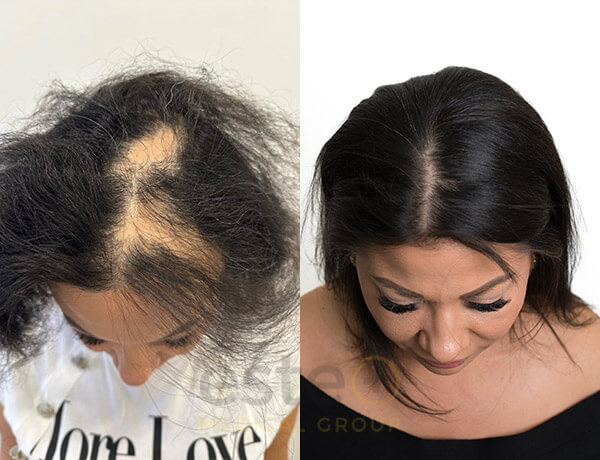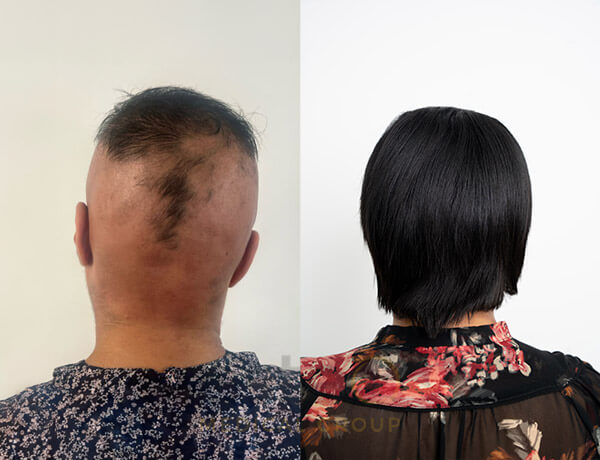Are you suffering from hair loss on your scalp or other parts of your body? Alopecia can affect anyone at any age, and it can be challenging to live with. Fortunately, effective treatment options are available, and Este Medical Group in Nottingham is here to help.
As experts in hair loss treatment, our alopecia specialists in Nottingham understand the emotional impact of hair loss on your self-esteem, confidence, and overall well-being. We offer a range of treatment options tailored to your specific needs and goals.
Alopecia is a condition that various factors, including genetics, autoimmune disorders, stress, and certain medications, can cause. It can be distressing and affect your quality of life, leading to anxiety, depression, and social isolation. It can feel like there is no solution - but there is hope.
We offer specialised treatment options for both men and women, as we understand that the causes and effects of alopecia can be different for different genders. Our team of experts will work with you to determine the best treatment option for your specific needs and goals.
If you are looking for effective alopecia treatment in Nottingham, Este Medical Group is here to help. Contact us today to schedule a consultation and take the first step towards finding the proper treatment for you. Don't let hair loss control your life any longer – we can help you start feeling like yourself again.
Check Out Este’s
Nottingham
Clinic!
Jessica's Incredible Hair Regrowth Journey with Este Medical:
What is Alopecia?
Alopecia is an autoimmune condition that causes temporary or permanent hair loss. This condition can happen anywhere on the body, but is most concerning when it attacks your scalp, as balding and patchy hair loss on the head is more difficult to deal with. For instance, alopecia on the scalp can start as small round patches of missing hair, which can appear in a matter of weeks, and grow larger and more visible if not treated.
Alopecia exists in many different forms: alopecia areata, androgenic alopecia, traction alopecia, or frontal fibrosing alopecia. An Este Medical hair loss consultation at our alopecia clinic will determine which type of alopecia you are experiencing and the best hair loss treatment personalised to you.


The Causes & Symptoms of Alopecia
Common factors linked to hair loss caused by alopecia are:
- Ageing
- Stress
- Hormone changes
- Medical conditions
- Genetics
Alopecia symptoms can include:
- Small bald patches on your head, or your body
- Losing a large amount of hair in a short period of time
- Small bald patches start to become larger and more visible
- New bald patches start to appear in different areas; meanwhile, hair may return to initial bald patches
- You experience more hair loss during cold weather episodes
- You develop brittle, red and pitted nails on your fingers and toes
The only way you can be sure you have hair loss from alopecia is to have a professional consultation with a hair expert. Book an appointment through our website.














Speak to an expert today
Call us or fill out our quick and easy online form and we’ll be in touch to arrange a date that best suits you
Available Alopecia Treatments
The good news is, even though alopecia causes hair loss, it doesn’t destroy the hair follicles — that means hair follicles have the ability to regrow hair under the right clinical conditions, with the right treatments. Este Medical Group has several effective treatments available for your type of alopecia.

Treatments and types of Alopecia include:
Alopecia Areata
Hair loss may occur suddenly and often begins with one or more bald patches that may overlap (e.g., patchy hair loss). This condition causes cells in your immune system to surround and attack your hair follicles. Alopecia Areata treatment may include: immunosuppressant medication, steroid creams, tablets, or injections such as Este’s mesotherapy for hair loss, as well Este Medical laser hair growth therapy and Este Exciplex light therapy for alopecia.
Androgenic Alopecia
Also known as male/female pattern hair loss. This type of alopecia condition tends to target the top and front of the scalp. It is a hereditary condition that can also be influenced by hormone levels and ageing. Treatment may include: Minoxidil, mesotherapy, Este Exciplex light therapy, Este Medical laser hair regrowth therapy, and/or a FUE hair transplant.
Traction Alopecia
This type of hair loss is often caused by repeated trauma to hair follicles, or from pulling hair into hairstyles that put tension on the roots. When hair is pulled from the roots to make a hairstyle it can cause permanent damage (e.g., extensions, high ponytails, braids, cornrows). As hair loss may occur around the hairline and temples an Este DHI hair transplantation may be the most appropriate treatment.
Frontal Fibrosing Alopecia
This is a rare type of alopecia that causes hair to recede at the front and sides of the head and may also affect the eyebrows. This type of extreme alopecia is most commonly experienced by postmenopausal women, and is not typical for younger females or males. Treatments may include: topical steroids, antibiotics or hormones, Exciplex light therapy, laser hair regrowth therapy, and/or a hair transplant. Este Medical Group has several successful hair loss treatments available to effectively address your alopecia. Book a consultation to talk about your expectations and goals.
Frequently Asked Questions
Is Alopecia permanent?
There are different types of alopecia and so this condition can be permanent for some and temporary for others. Stress and hormone-related alopecia is often temporary and may be treated by addressing the cause of the problem.
How can I prevent Alopecia?
If your alopecia is hereditary, it’s not possible to prevent it. However, at Este Medical, we offer a range of innovative treatments at our alopecia clinic that can help to alleviate this condition. It’s also advisable to avoid hairstyles that place a strain on your scalp such as tight ponytails and buns.
Is there any medication for Alopecia?
If you want to learn more about medication for this condition, we strongly recommend you speak to your GP.
What techniques does Este Medical use to treat alopecia?
As hair specialists, we know the best procedures and the best techniques to perform depending on the severity of the hair loss. During your consultation and treatment, we’ll explain how we focus on existing hair follicles, increasing the blood flow to the scalp which helps to natural regrow hair.
How do I know which alopecia treatment is right for me?
When you book your consultation, our hair loss experts will analyse your condition and determine the best alopecia treatment for your unique hair loss. Each treatment will be made personalised to you to ensure you achieve your desired outcome and nothing less.







.jpeg)


















![Kyle - alopecia Results [laser hair regrowth + PRF] Este Medical](https://cdn.prod.website-files.com/5e79ab6f4416e9822cb361b7/66e816f001da0103dddbc38c_Kyle_-Before-after-1.webp)
![Nicola Alopecia results [Laser hair Regrowth + PRF] Este Medical](https://cdn.prod.website-files.com/5e79ab6f4416e9822cb361b7/66e81e632201297ffe153da8_Nicola_-Before-after-1.webp)
.jpg)





































_logo.svg.webp)














































.webp)